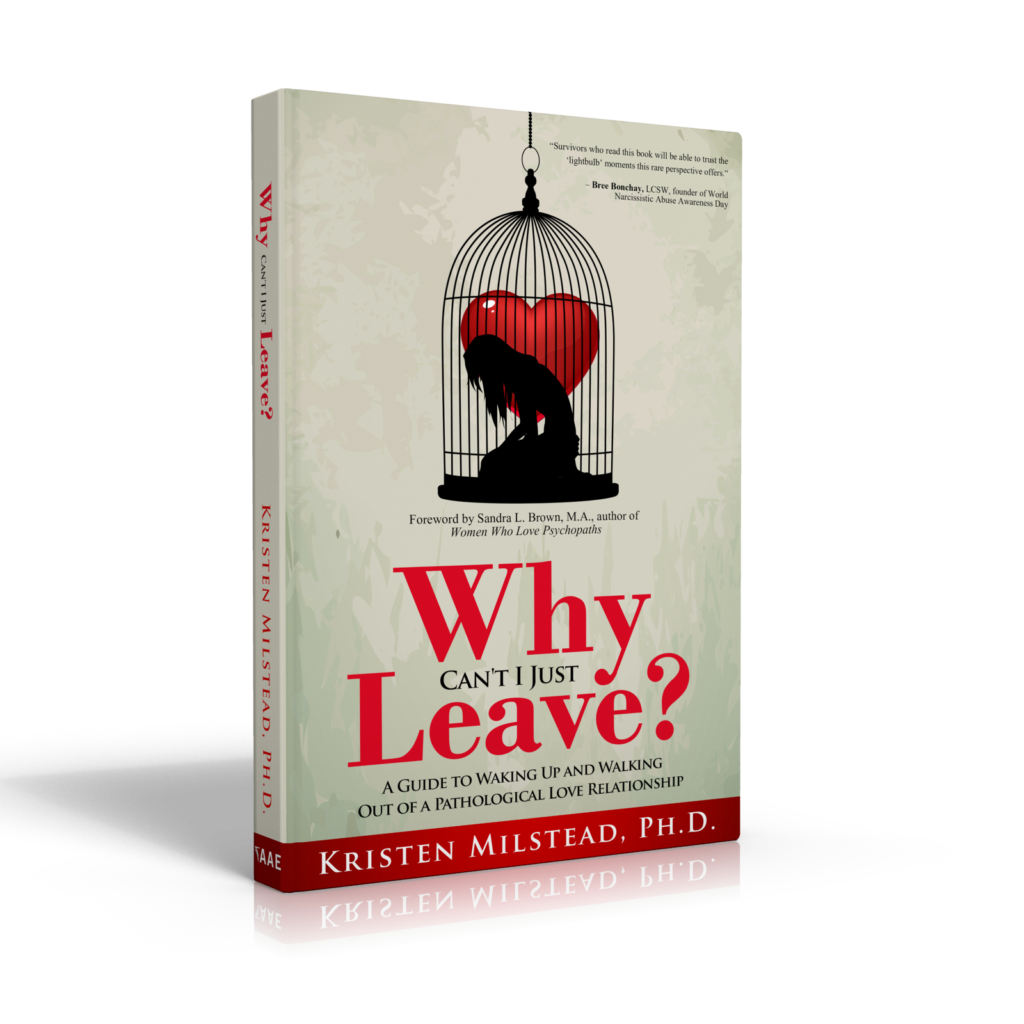What is coercive control?
Most survivors of narcissistic abuse have probably not heard the term “coercive control,” but they should definitely become familiar with it.
Coercive control is a form of domestic abuse in which the abuser instills feelings of extreme dread and anxiety through psychological manipulation and environmental control.
The narcissistic abuse dictionary defines it as:
“Excessive monitoring and covert or overt dominance over one or more areas of a partner’s life, such as finances, career, friendships, clothing choices, hobbies, or other. It usually begins as concern for the partner and is cloaked or hidden in many seemingly loving behaviors as well.
“It also starts slowly and can be subtle. Many tactics may be used to obtain this control. These include criticizing in an off-handed way his or her body, clothing, accomplishments or friends; invading his or her privacy by reading private messages or listening in on phone calls; accusing him or her of cheating when no evidence exists; insisting he or she remain in constant contact; and making it very unpleasant for him or her to do things that don’t involve the narcissist.
“The results of these behaviors are to lower the self-esteem of the partner and isolate him or her from others and give the narcissist more control.”
Slowly, the victim begins to behave in the way that the abuser desires based on fear of what will happen if he or she doesn’t.

Coercive Control is about Fear
There was one clear moment when after I went no contact that I knew I had been in a psychologically abusive relationship.
It happened when I heard the soft *ding* coming from my phone beside me to let me know I had a text, and my first instinct when I heard it had been fear.
The fear was not that the text would be from him.
It was fear at the announcement that I was being contacted, and what the implications of an announcement of that kind had often meant for me.
I had just changed all of my phone settings back the way I wanted them permanently so that I could see and hear any messages or contact made across any phone app from anyone in a manner that was convenient for me.
I had devised quite an elaborate ritual over the years based on a flow chart of criteria I was juggling in my head.
E-mails were usually okay because they were almost always formal or less immediate. Visual or audio notifications that I had messages or was being sent something from any social media app were always dangerous.
Dangerous.
Want more? Please take a moment to sign up to get all future articles delivered straight to your inbox.
I had learned never to allow any part of any message to appear on the display when it arrived– ever. Messages from some people would be muted during certain blocks of time.
And some apps I would silence completely so that there were no flashing lights or cute noises indicating someone wanted to send me a picture or talk to me. Better just not to call attention to it.
Sometimes I’d even just delete the app temporarily because it was faster and less risky than thinking I’d shut off notifications and finding out I hadn’t eliminated all of them.
I remember being in a panic sometimes during that thirty minute window when he would be on his way over, or I would be in an Uber on the way to his place, trying to go through that checklist in my mind and make sure everything on my phone was on the correct setting so that important things from friends and family members could still get through, but nothing that could seem suspect would.
A message from a male friend. Someone on my karaoke team asking about props. A random guy I didn’t even know sending me a friend request on Facebook.
For any of these and a lot less, the price I paid would be steep.
I don’t remember when I started doing it. I can think back and remember times he violated my privacy when I left the room. I would come back in and he would hold up my phone or tablet knowingly.
“You’re still E-mailing your ex,” he said, scrolling through a rather embarrassing E-mail exchange in which my ex and I had been discussing our breakup.
Incredulously, I told him to check the date on the email he was reading. He’d dug deep into my “Sent” folder and the exchange was a year old. I’d sent the email before the two of us had even met much less started a relationship.
He never apologized for digging through my E-mail without cause, or even for making false accusations. Strangely, he didn’t even seem reassured.
It wasn’t that I had something to hide, it was that he could make nothing into something.
Any text I received, he wanted to know who it was from. Any notification he learned about, he wanted to know from what app was sending it, as he must have felt it gave him a clue about what I was up to.
If I didn’t check my phone when the notifications came in, that was suspect too, because to him, that meant I was hiding something.
I wasn’t allowed to get texts or messages or Snapchats or likes or any form of contact from guys.
By not allowed I mean I wasn’t allowed to get them without being punished in some way.
The punishments ranged from the withdrawal of his affection to verbal abuse and name-calling, from accusations that no amount of reassurance could deflect to threats from him that he would engage in whatever behavior he imagined in his head that I was doing.
He learned my lock screen swipe-codes, or picked my phone up to snoop in the seconds it would take me to go get a drink from the refrigerator before it could lock.
If I gave him my phone to order pizza or play music, instead, in two minutes, he’d be in my Facebook messaging app scrolling through looking for conversations with men and questioning me about any he found.
An evening could go from idyllic to nightmarish with one piercing glare that would make my stomach clench.
He asked me once if I had any hidden apps. I didn’t even know what hidden apps were much less have any.
I found it to be an odd, random question, so I spent a couple of hours doing some online investigation on the subject, and was amazed find out all about what you could download and hide on your phone if you had an inclination.
It wasn’t long after that that I slowly started to realize the truth about his obsession with my phone.
He was asking me if I had a hidden phone app because he had one. In fact, all the things he was accusing me of and tormenting me over were things that he was himself guilty of–and more.
His phone was his gateway to another world that he could use to entertain himself and still maintain his impression in the real world as faithful.
Dating apps, Skype sex, cam girls, meeting and making dates with other women on the side–you name it, he was doing it. This, I found out later.
He had an entire secret life on his phone that no one in his life would even suspect was going on… and if he was getting away with it, well, he thought I must be too.
Narcissists love their own cell phones. But they don’t like yours.

What is Coercive Control?
Sociologist and forensic expert Evan Stark, who first coined the term “coercive control” writes:
“Coercive control shares general elements with other capture or course-of-conduct crimes such as kidnapping, stalking, and harassment, including the facts that it is ongoing and its perpetrators use various means to hurt, humiliate, intimidate, exploit, isolate, and dominate their victims,” says sociologist Evan Stark, who first came up with the term for this type of domestic abuse.
“Like hostages, victims of coercive control are frequently deprived of money, food, access to communication or transportation, and other survival resources even as they are cut off from family, friends, and other supports through the process of ‘isolation.'”
It can take many forms, including threats, gaslighting, verbal put-downs, withholding, and restrictions on your behavior or freedom (as enforced by some of the other forms of coercive control such as withholding affection or calling you names if you don’t comply).
It can also include low-level violence that doesn’t leave any marks, or pressuring you to engage in sexual behavior that you’re opposed to or that makes you feel ashamed.
It can rise to the level of serious physical violence, but often it doesn’t.
It doesn’t need to in order to have the intended effect.
How Coercive Control Takes Hold
I was dehumanized and my dignity was eroded one scornful comment, one unpredictable rage, one withdrawal of affection at a time that had me questioning myself instead of him.
The erosion occurred through his deep-seated jealousy over other men that bled over into a host of control issues. The introduction of this side of him didn’t even begin slowly or appear months into our relationship. It was apparent immediately.
Before we had even met in person, when we were still just words on a screen to one another, there was an evening when I hadn’t texted him for a few hours. I finally sent him a text late in the night when I returned home from a night out.
He responded by asking me if I’d been on a date. I didn’t see any reason to lie.
“Yes, I was,” I said.
“Well, stop going on dates with other guys!” he said.
I don’t know if I’d thought he was kidding around or if I’d just thought he was young and inexperienced, that he didn’t understand dating norms, that it was a perfectly normal thing to do to go on a date with another man outside of an exclusive relationship with him or anyone else.
I’d found it a little amusing, but told him he couldn’t tell me not to date others. He’d made some excuse about how he didn’t want me to find a boyfriend before he and I had even had a chance to meet.
I brushed it off, ignoring it as a red flag.
But it was only a sign of what was to come.
From beginning to end, he accused me of talking to, being attracted to, being around or engaging in physical activity with other men on a consistent basis.
He made threats about what would happen if I did.
He checked up on various aspects of my life to ensure I hadn’t.
He set verbal and physical traps for me in which there was no way for me to ever come out looking anything other than guilty and confirming his beliefs
He stalked me and violated my privacy
He forbade me from engaging in activities that would put me in contact with other men.
He made degrading comments if I did something he didn’t like even if it had nothing to do with men at all but aroused his suspicions
He punished me by raging or cheating on me if I didn’t do as he thought I should or even if he just suspected I hadn’t.
I constantly tried to prove that I loved and wanted only him, while also trying to maintain some semblance of dignity.
But the more I gave him, the more he wanted from me. If I refused to answer a question because I found it degrading or disempowering, he used it as proof of my guilt rather than listening to my pleas to treat me with respect.
It was a trap, and when every path leads to pain, an anxiety takes hold that never leaves. Even in your sleep.
Why Don’t You Leave If It’s So Bad?
For months after we broke up, when I thought back to all of the persecution and the constant badgering about whether I was cheating or who I was talking to or what I had been doing, my body would immediately react to that sense of hopelessness I always felt at those times, as if bars have suddenly clamped around me.
I would feel, in those moments of reflection, a sinking desperation in my chest and a flip-flop of anxiety in the pit of my stomach. I knew with the first glare or accusatory text that, no matter what I did, I wouldn’t escape whatever I was about to face. There was no rhyme or reason to it.
Coercive control is a horrible experience to endure on its own, but it’s not the same as narcissistic abuse. It’s only a component.
When combined with the other two types of emotional abuse (lovebombing and deception of intent), narcissists can maintain an oppressive force in our lives that is difficult to remove ourselves from.
After the lovebombing stage is when the coercive controlling (devaluing) began. By then, the two versions of him were competing for dominance in my mind.
What is so wrong about a relationship with a narcissistic sociopath is that they inspire you to be your best self so they can then strip it away a piece at a time until you are left half-alive.
They crave that light you shine upon them and use it to feel alive and fear the day they finally extinguish it and they’ll be left again in darkness (but they will blame you for its death).
Their greediness slowly cages you in the prison with them until you begin to feel their pervasive emptiness. You think the light will save you both, but it won’t.
The biggest betrayal is that you have to betray yourself to leave–to leave you have to cut a piece of yourself away because they have poisoned it with their self-loathing. It’s your best self, the inspired self, the one that believed.
They make you do it. They force you to do it. Because they will never let you go. Then you bleed, bleed, bleed, bleed, bleed, bleed, bleed until you think you’ll never stop.
The fear is all around you now, but it’s a new kind of fear. You’re finally free.
This is what coercive control feels like.
Are you or have you been a victim of coercive control?
Lovefraud can help. I know firsthand how difficult it can be to “break the spell” even after the relationship ends.
This Webinar sponsored by Lovefraud is taught by the original developer of the Emotional Freedom Technique here: EFT Tapping to break the addiction to the narcissist. EFT tapping can help with reprocessing traumatic memories in the brain so they no longer have the same ability to dominate you as they once did, releasing the power the narcissist once had over you.
I personally was a recipient of Eye-Movement Desensitization and Reprocessing (EMDR) therapy and it was instrumental in my recovery. EFT Tapping is a very similar. This affordable course is one of a kind in that it specifically targets victims of narcissistic abuse. It can give you some real, hands-on techniques to start using immediately.
Lovefraud webinars on relationship abuse are presented by experts but also from the perspective of experience. Almost every instructor learned about the behavior of sociopaths in relationships the hard way. They’re affordable and offer practical information you can start using immediately. If you decide to try the course, send me an email and let me know how it went!
Don’t forget to check out these resources:
- Taking Your Life Back After a Relationship With a Narcissist – Free Recovery Toolkit
- Comprehensive Narcissistic Abuse Dictionary
- The Best Resources for Narcissistic Abuse Recovery
Do you want to tell your story and have it published? Go here to learn more.







7 Comments
Emma
My narcissist ex would go on my phone without my permission multiple times. Initially I brushed it off since it seemed so minor and I had nothing to hide. But each time I asked him about it he would deny it adamantly. I initially trusted him, but then some things didn’t add up, such as my phone screen brightness setting was set to max and I never do that.
I was always anxious and worried but so in love with him i overlooked his other questionable acts like triangulating me with his best female friend and other people in his life, finding him active on a dating app 2 months in when we were official, and him dripfeeding me the truth when I thought I got the whole story.
The final straw that made me leave the love of my life was when he told me to basically find a rich man to date if I wanted to be provided for and not go 50/50 on bills anymore. He was showing me the door act!
I broke up with him that night, I loved him so much but the anxiety overtook the comfort of the relationship. “I wanted to marry you, have children together, grow old, I’ll always love you!” He said…. Oh I wanted it so badly too and I was questioning if I made a horrible mistake. After all he felt like he was my soul mate everything else was great…
Then when I broke up with him, by fate
I learned of the term narcissist the same day and was shocked to see he fit all the criteria.
Triangulation. Covert put downs. Love bombing. Idealization. Devaluation. Attention span of a gnat and easily bored. Spoiled by mama.
I went no contact after reading all the survivors stories and experiences. But if I never learned of the term narcissist that night I would have gotten back together with him. I would be subjected to all the ups and downs, not understanding what was going on. Thank God it only lasted for 6 months because of my intuition telling me something was wrong even though my heart was in heaven. Anyone that lies to your face twice or tries to make you jealous of other females in his life – dropped fast. Thank you for sharing your experiences projection is real.
Tany
I’ve read a lot of information about NPD in order to save myself from my toxic expartner, and I can say that this is the first article that describes 100% my story, with the same situations. It is a period of 9 months as we broke up, and he is still pursuing me everywhere as we never broke up. Their illness is very severe one…really.
Keosha
I thank you for all this important information please inbox me with more info.I was with a narcissistic for about 6 years it was most hardest ,terriblest thing to go through
Jacquelyn
Can I just say you are amazing and really the only one that describes narcissism so accurately it’s scary!! Therapists have no clue. I told a therapist how he slowly took all my responsibilities away with my children because I didn’t do them well enough and She told me “ but he’s also helping you out, right?!” How crazy is that??? Then she dumped me at a heightened level of anxiety and never even checked on me.
I find you so comforting and can’t thank you enough. I’m still in a trapped place but try to have hope.
Eric
Interesting read, how does this differ from other forms of manipulation?
Kristen Milstead
Hi Eric: This is a great question! I am working on some additional writing that talks about this very thing. I do not believe that narcissistic abuse and coercive control are the same thing, but that the definitely they overlap and the concept of coercive control is useful for understanding the concept of narcissistic abuse, but it’s not sufficient. For instance, coercive control is largely about the devaluation aspect of narcissistic abuse. Yet, one of the most important aspects of narcissistic abuse is love-bombing, which is also a very important form of manipulation. Narcissists can rely upon a lot of deception to manipulate–like con-artistry. And in some forms of con-artistry, there may be no elements of coercive control at all, for example, romance scams. I think narcissists use both love and fear to manipulate people—and coercive control captures the fear element perfectly. Thank you for asking this question.
Kim
[Comment deleted at the request of the commenter]